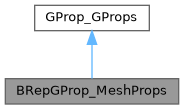Computes the global properties of a surface mesh. The mesh can be interpreted as just a surface or as a piece of volume limited by this surface.
More...
|
| | BRepGProp_MeshProps (const BRepGProp_MeshObjType theType) |
| | Constructor takes the type of object.
|
| |
| void | SetLocation (const gp_Pnt &theLocation) |
| | Sets the point relative which the calculation is to be done.
|
| |
| void | Perform (const Handle< Poly_Triangulation > &theMesh, const TopLoc_Location &theLoc, const TopAbs_Orientation theOri) |
| | Computes the global properties of a surface mesh of 3D space. Calculation of surface properties is performed by numerical integration over triangle surfaces using Gauss cubature formulas. Depending on the mesh object type used in constructor this method can calculate the surface or volume properties of the mesh.
|
| |
| void | Perform (const Handle< Poly_Triangulation > &theMesh, const TopAbs_Orientation theOri) |
| |
| BRepGProp_MeshObjType | GetMeshObjType () const |
| | Get type of mesh object.
|
| |
| | GProp_GProps () |
| | The origin (0, 0, 0) of the absolute cartesian coordinate system is used to compute the global properties.
|
| |
| | GProp_GProps (const gp_Pnt &SystemLocation) |
| | The point SystemLocation is used to compute the global properties of the system. For more accuracy it is better to define this point closed to the location of the system. For example it could be a point around the centre of mass of the system. This point is referred to as the reference point for this framework. For greater accuracy it is better for the reference point to be close to the location of the system. It can, for example, be a point near the center of mass of the system. At initialization, the framework is empty; i.e. it retains no dimensional information such as mass, or inertia. However, it is now able to bring together global properties of various other systems, whose global properties have already been computed using another framework. To do this, use the function Add to define the components of the system. Use it once per component of the system, and then use the interrogation functions available to access the computed values.
|
| |
| void | Add (const GProp_GProps &Item, const Standard_Real Density=1.0) |
| | Either.
|
| |
| Standard_Real | Mass () const |
| | Returns the mass of the current system. If no density is attached to the components of the current system the returned value corresponds to :
|
| |
| gp_Pnt | CentreOfMass () const |
| | Returns the center of mass of the current system. If the gravitational field is uniform, it is the center of gravity. The coordinates returned for the center of mass are expressed in the absolute Cartesian coordinate system.
|
| |
| gp_Mat | MatrixOfInertia () const |
| | returns the matrix of inertia. It is a symmetrical matrix. The coefficients of the matrix are the quadratic moments of inertia.
|
| |
| void | StaticMoments (Standard_Real &Ix, Standard_Real &Iy, Standard_Real &Iz) const |
| | Returns Ix, Iy, Iz, the static moments of inertia of the current system; i.e. the moments of inertia about the three axes of the Cartesian coordinate system.
|
| |
| Standard_Real | MomentOfInertia (const gp_Ax1 &A) const |
| | computes the moment of inertia of the material system about the axis A.
|
| |
| GProp_PrincipalProps | PrincipalProperties () const |
| | Computes the principal properties of inertia of the current system. There is always a set of axes for which the products of inertia of a geometric system are equal to 0; i.e. the matrix of inertia of the system is diagonal. These axes are the principal axes of inertia. Their origin is coincident with the center of mass of the system. The associated moments are called the principal moments of inertia. This function computes the eigen values and the eigen vectors of the matrix of inertia of the system. Results are stored by using a presentation framework of principal properties of inertia (GProp_PrincipalProps object) which may be queried to access the value sought.
|
| |
| Standard_Real | RadiusOfGyration (const gp_Ax1 &A) const |
| | Returns the radius of gyration of the current system about the axis A.
|
| |
Computes the global properties of a surface mesh. The mesh can be interpreted as just a surface or as a piece of volume limited by this surface.

 Public Member Functions inherited from GProp_GProps
Public Member Functions inherited from GProp_GProps Protected Attributes inherited from GProp_GProps
Protected Attributes inherited from GProp_GProps